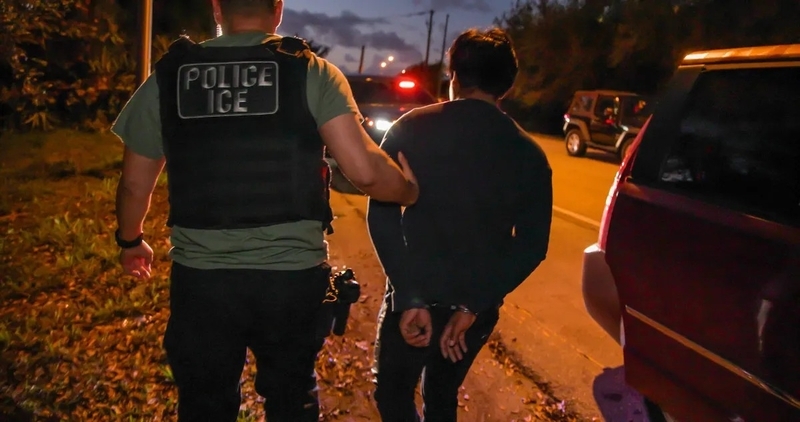Legislators Argue Over Cooperation With ICE
GOP bill requires local law enforcement to help federal deportations.

Wisconsin Republicans want to require cooperation with Immigration and Customs Enforcement. (Photo via ICE)
Wisconsin Republicans continued their push Tuesday for a bill that would require local law enforcement to report people charged with a felony to Immigration and Customs Enforcement (ICE) if they cannot verify their immigration status. Legislative leaders are also demanding that state government officials cooperate with and support President Donald Trump’s deportation agenda.
State legislatures across the country have taken action to either require or prohibit local law enforcement cooperation. According to a Stateline report, experts have said jails are the easiest place to pick up people for deportation and when local law enforcement cooperates there are more arrests. Noncooperation in states, including California, is leading to a decreased number of arrests and deportations.
Amanda Merkwae, advocacy director for the ACLU of Wisconsin, testified against the legislation before the Senate Licensing, Regulatory Reform, State and Federal Affairs Committee Tuesday. Merkwae detailed extensive actions the Trump administration has taken to target immigrants since the bill was first introduced by lawmakers and cautioned against having local law enforcement play a larger role in those efforts.
Merkwae quoted a former North Carolina sheriff who said at a 2008 conference about the role of local police in immigration enforcement, “if you don’t have enough evidence to charge someone criminally, but you think he’s illegal, we can make him disappear.”
“A lot has happened even since the Assembly public hearing on this bill back in February,” Merkwae said, reeling off a list including “the disappearing of legal residents to gulags without due process,” “inappropriately invoking the Alien Enemies Act to remove people,” to “escalating violent arrests” by masked Department of Homeland Security agents, detaining students and activists for exercising their First Amendment rights in ICE facilities, arbitrarily canceling student visas, “threatening to disappear U.S. citizens to El Salvador,” “and just this week — and it’s only Tuesday — eliminating temporary protective status of thousands of immigrants despite a court order, blocking the entry of refugees who spent years getting approved through a lengthy process while living in refugee camps and third countries and the administration openly exploring the suspension of habeas corpus.”
“When the federal government is violating the Constitution, we must resist pressures to integrate local governance into its abuses,” she said.
The Assembly passed the bill in March along party lines, and Gov. Tony Evers has vowed to veto it. Lawmakers introduced the bill just three weeks into Trump’s new term.
Sen. Julian Bradley (R-New Berlin) and Rep. Jim Piwowarczyk (R-Hubertus) said the bill is narrow and seeks to help ensure that Wisconsin is safe.
“This proposal will make it easier to remove dangerous criminals from our communities. It’s shocking to think that a handful in law enforcement and our government would rather protect felons than work with our federal partners to stop the flow of crime and drugs into our neighborhoods,” Bradley said.
Since March, the number of Wisconsin counties with official agreements to cooperate with ICE has grown to 12, including Washington, Waupaca, Winnebago and Wood. Two counties — Dane and Milwaukee — have previously been identified by ICE as noncooperative.
Milwaukee County has become a focal point of controversy over ICE cooperation. Milwaukee County Judge Hannah Dugan was arrested and indicted on charges of obstructing federal agents and concealing a person to prevent an arrest. ICE has arrested at least four people since March at the Milwaukee County Courthouse. Republicans have also accused Evers of being noncooperative after he told state employees to contact a lawyer before handing over information if ICE showed up at their office buildings.
“I am deeply concerned that some local jurisdictions, including Dane County and Milwaukee County, have severely limited their cooperation with ICE. Many, if not most, Wisconsin sheriffs are already doing everything they can to identify the legal immigrants in their jails and cooperate with ICE holds,” Piwowarczyk said. “This bill won’t affect them. It will affect those who refuse, imperiling the safety of all Wisconsin citizens.”
The bill — AB 24 — would require local law enforcement to check the citizenship status of people in custody for felony offenses and notify ICE if their citizenship can’t be verified. It also requires sheriffs to comply with detainers and administrative warrants received from the Department of Homeland Security regarding people held in the county jail for a criminal offense. If a sheriff refuses to comply with the law, the county would face a 15% deduction in its state aid payment the following year.
Merkwae said that the bill authors were taking a narrow reading of the bill, but “with 15% of an entire county’s share revenues on the line,” this will lead to sheriffs erring on the “side of overreporting.”
Democrats on the committee had an array of concerns about the bills, especially given the actions that the Trump administration has taken since the start of his term.
Larson asked lawmakers whether they trusted ICE.
“You’re throwing your trust in ICE — that 10 out of 10 [times] ICE is doing the right thing, 10 out of 10 times ICE is only taking people who have committed felonies and following the guidance of the president,” Larson said. “I don’t trust this federal government because [President Trump] came out on the record and said, ‘I don’t know if people deserve due process, I don’t know if I’m supposed to uphold the Constitution.’ Those are the words of the person who’s in charge of the administration.”
Bradley said he rejected the premise of Larson’s question.
“We aren’t empowering ICE,” Bradley said. “We don’t have the power to empower ICE. That’s not what we’re doing. We’re telling the sheriffs to cooperate with the federal government as they’re required to because we have instances where people have publicly come out and said, we will not cooperate… In this bill, [people] have also committed and are being charged with a felony. That’s what this bill is about.”
Larson corrected lawmakers several times when they said the only people covered in the bill had committed a crime: “75 of the people shipped overseas to El Salvador prison have no criminal history, and so this seems like an effort to jump on that bandwagon.”
“Accused,” Larson said at one point. “Accused. You keep forgetting that part — alleged.”
Sen. Tim Carpenter (D-Milwaukee) said he also doesn’t trust the current system, especially as ICE isn’t being transparent about its work.
“It seems like it’s more of a campaign pitch to grab as many people as you can, but there are people that are innocent,” Carpenter said, adding that he fears that the bill if passed is “legitimizing a system that is not doing what we wanted it to do.”
Carpenter noted he has the largest Latino population among Wisconsin Senate districts. From events hosted in the district and conversations with constituents, he said, it’s “very noticeable that people are scared, and they don’t want to have someone — they’re innocent and get caught up in the system and end up in El Salvador.”
Carpenter told the bill authors to try to convince him that the bill won’t further affect those communities.
“How do we deal with that impact on a sizable community — many of whom have done nothing wrong?” Carpenter asked.
“I think the best thing that could happen is if people were honest about what this bill does, because by not being honest or conflating issues, what we’re doing is we’re spreading that fear,” Bradley said. “So, if you are here illegally and you are being charged with a felony, this bill, this applies to you, and you should be concerned. If not, you shouldn’t be concerned.”
Larson asked why there is a financial penalty in the bill, saying the premise of the bill appears to be that law enforcement must cooperate “or we’re cutting your damn funding.”
“If they’re not cooperating with ICE and are not doing what they’re supposed to do to keep their community safe, there should be a penalty and the penalty should be felt,” Bradley said.
“Do you think the sheriff’s department will be able to keep communities safe by cutting them?” Larson asked.
“If they follow the guidance in the bill, they won’t have to worry about that,” Bradley said.
As Trump deportation efforts ramp up, Wisconsin Republicans push ICE cooperation was originally published by the Wisconsin Examiner.
If you think stories like this are important, become a member of Urban Milwaukee and help support real, independent journalism. Plus you get some cool added benefits.





















